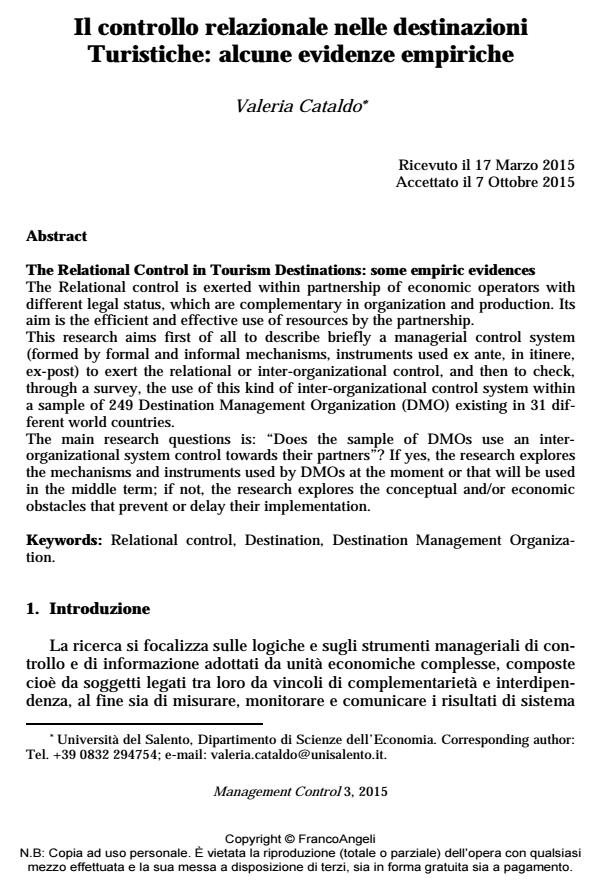The Relational Control in Tourism Destinations: some empiric evidences
Journal title MANAGEMENT CONTROL
Author/s Valeria Cataldo
Publishing Year 2015 Issue 2015/3
Language Italian Pages 26 P. 23-48 File size 121 KB
DOI 10.3280/MACO2015-003003
DOI is like a bar code for intellectual property: to have more infomation
click here
Below, you can see the article first page
If you want to buy this article in PDF format, you can do it, following the instructions to buy download credits

FrancoAngeli is member of Publishers International Linking Association, Inc (PILA), a not-for-profit association which run the CrossRef service enabling links to and from online scholarly content.
The Relational control is exerted within partnership of economic operators with different legal status, which are complementary in organization and production. Its aim is the efficient and effective use of resources by the partnership. This research aims first of all to describe briefly a managerial control system (formed by formal and informal mechanisms, instruments used ex ante, in itinere, ex-post) to exert the relational or inter-organizational control, and then to check, through a survey, the use of this kind of inter-organizational control system within a sample of 249 Destination Management Organization (DMO) existing in 31 different world countries. The main research questions is: "Does the sample of DMOs use an interorganizational system control towards their partners"? If yes, the research explores the mechanisms and instruments used by DMOs at the moment or that will be used in the middle term; if not, the research explores the conceptual and/or economic obstacles that prevent or delay their implementation.
Keywords: Relational control, Destination, Destination Management Organization.
- Misure di performance innovative e modelli di business: il caso delle aziende aeroportuali italiane Vincenzo Fasone, Mariano Puglisi, in MANAGEMENT CONTROL 2/2017 pp.71
DOI: 10.3280/MACO2017-002005 - Le sfide evolutive del Management Control tra relazioni strategiche, innovazione e discontinuità: a knowledge transfer matter? Andrea Cardoni, in MANAGEMENT CONTROL 1/2018 pp.5
DOI: 10.3280/MACO2018-001001
Valeria Cataldo, Il controllo relazionale nelle destinazioni Turistiche: alcune evidenze empiriche in "MANAGEMENT CONTROL" 3/2015, pp 23-48, DOI: 10.3280/MACO2015-003003